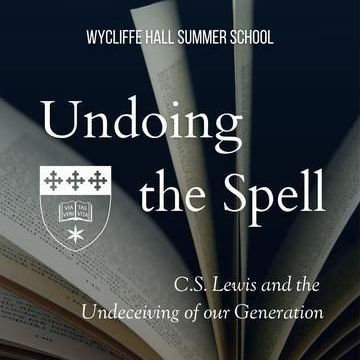"A Test of Allegiance": A Sermon on Luke 12:49-53
This sermon on Luke 12 was given at St. Martin's Episcopal Church in August of 2019. It has been edited slightly, but otherwise in its original form.
I recently read the book “Educated,” which tells the difficult, but powerful story of Tara Westover. Born to survivalist parents who live in the mountains of Idaho, Tara was brought up off-grid in a very insulated world. She didn’t receive an education, she was never allowed to receive medical treatment and she was so unknown to the government she didn’t even have a birth certificate until she was 9. Tara spent most of her childhood learning how to salvage metal in her father’s junkyard and how to use herbs to treat all and any ailments in her mother’s kitchen. The youngest of seven, it was one of Tara’s older siblings taught her to read. One day Tara decided she wanted to get something of a more formal education so she snuck an algebra book into her room and started to learn some basic math. The radical nature of Tara’s upbringing is a story in and of itself. But the additional piece of her journey is that she suffered significant and persistent physical abuse from one of her older brothers. Abuse that was minimised, covered up and denied. She didn’t even realise it was wrong. It was her normal.
By what could be considered a miracle, Tara managed to get to university – and she slowly begins to find a worldview outside of the one she received growing up. It was this education that saved her. As time progressed and her learning continued, she found herself increasingly at odds with the views of her family. She could name the abuse for what it was. And finally, after trying to confront them and deal with the reality of how she’d been wronged, her parents cut all ties. Tara made the costly decision that living in the truth she had come to know was more important to her than the abusive relationships she grew up in. A family divided.
***
When we read the gospel reading today, I think most of us would find it hard reading. Most of us would find it hard to reconcile with our understanding of a God who is merciful, loving, compassionate and forgiving. A God who is the Prince of Peace. Yet here in unequivocal terms we hear Jesus saying he has not come to bring peace but division. How on earth do we make sense of that? How do we hear those words and respond in faith? How do we allow these words from Luke’s gospel draw us closer to Jesus?
The truth is the God we worship is both the God who Judges and the God who Forgives. And Jesus, being God in human form, is exactly the same. So when we hear his words “I came to bring fire to the earth, and how I wish it were already kindled!” (Luke 12:49 NRSV) we hear something of the judgement Jesus brought. A judgement that faced each person as they were presented with Truth personified. In encountering Jesus – the way, the truth and the life – they (as we) were presented with a choice: will they embrace God’s truth or will they reject it for their own way? Not just in the abstract, but in the detail.
Will I respond to God as my everyday life comes under the scrutiny of Christ? As the light of God’s Word shows up my sin and failure and I experience Him saying No to my sin and the acceptance and tenderness of His Yes to me?
In accepting or rejecting God’s truth, we also choose the consequences of doing so. Eternal life with God and His goodness. Or eternal life without. Jerusalem itself had been confronted with Jesus’ truth and challenge to their religious idolatry and nationalism and they chose the latter. They rejected repentance and change and stayed with what they knew. A life where they were comfortable and had power. And so, a chapter later at the end of Luke 13, Jesus utters these words, foretelling the Roman destruction of Jerusalem as the manifestation of his judgement:
“Jerusalem, Jerusalem, the city that kills the prophets and stones those who are sent to it! How often have I desired to gather your children together as a hen gathers her brood under her wings, and you were not willing! See, your house is left to you. And I tell you, you will not see me until the time comes when you say, 'Blessed is the one who comes in the name of the Lord.'”
Jesus is the God who Judges.
But Jesus is also the God who Forgives.
He is the One suffered for our sake—who loved us enough to bring about our rescue. Yes, Jesus brings fire but he also brings salvation. “I have a baptism with which to be baptized, and what stress I am under until it is completed!” (Luke 12:50 NRSV). Jesus is stressed! He is preoccupied with the suffering ahead. Suffering that he knows is God’s will as a means to reconcile the world to Him. While Jesus brings judgement, he also brings the means to survive that judgement. He is the means. He is going to stand in the gap on our behalf. Even though He knows that many will reject this great and costly gift.
God–even in Jesus–brings judgement. But with it He brings the means for our salvation.
But when Jesus asks "Do you think that I have come to bring peace to the earth? No, I tell you, but rather division!" (Luke 12:51 NRSV) we hear of the consequences that we will face if we embrace the judgement and forgiveness Jesus offers. If we seek to follow Him, be faithful to him above all, we will experience conflict. If we allow his judgement in our lives to shed light on our sin and throw us back into the arms of his acceptance and forgiveness, and the grace to live differently, we will, in some way or another, suffer for it. Why is division inevitable? Because others will not make the same choice we make. Some will harden their hearts, act out of pride or shame or fear. And eventually worldviews collide and conflict ensues.
To put it another way, if we prioritise peace with God (i.e. living in a right relationship with Him and seeking to grow in Him) over and above other relationships where we might be expected “to keep the peace” in passivity and turn a blind eye, we’ll experience conflict. As we care more for what God thinks of us than those around us, we’ll find others displeased and dissatisfied that we are not playing their games and we might be rejected.
And so we come to the crux of the division Jesus brings: he will set father against son, mother against daughter and mother-in-law against daughter-in-law. Here we have probably the hardest test of allegiance: will we be faithful to God or faithful to family?
In the event the two become in opposition to one another, which would you choose?
We live in a world where some might say the role of family is being diminished. That might be true. But we also live in a world where people regularly say that the thing that is most important to them is their family. We talk about family being the important thing when it comes to what life is about. Not work. Not success. Friends come and go, but family is what matters. Blood is thicker than water.
Now God is a huge fan of family. He invented the concept. But families, like all things, are broken, flawed and marred by sin. And like we do with so many things we often idolise the gift of family, rather than worship the giver, God himself.
The test of allegiance we all face in greater or lesser ways is this: will my allegiance to God as revealed in Jesus Christ be greater than my allegiance to anything of this world, including my family relationships? Am I willing, should the need arise, to forgo those relationships most dear to me for the sake of my relationship with God? If I receive heat over a decision I make, something I sense God is asking to me do, that someone says is too risky, too generous or too foolish, will I follow God anyway? If I find that God calls me to call out something in my family that is not as it should be, maybe something psychology might call dysfunctional but we might call sinful, will I do so no matter the cost?
***
Tara Westover had her eyes opened by her education. By coming face to face with more of the truth about reality it cast a different light on her family life and eventually led to division. But it wasn’t out of spite, hatefulness or even anger that she left. In an interview she said she recognised her parents love for her was real, but unfortunately so too was their radicalism and the abuse. Despite her parents’ treatment of her, she writes about them with compassion and kindness. One review of her story said:
“This story, remarkable as it is, might be merely another entry in the subgenre of extreme American life, were it not for the uncommon perceptiveness of the person telling it. Westover examines her childhood with unsparing clarity, and, more startlingly, with curiosity and love, even for those who have seriously failed or wronged her.”[1]
Tara’s story is one of division, but not because of her resentment, it followed as world views collided and people she loved hardened their hearts to her. A prophet without honour in her own home.
In Jesus we don’t have just some of the truth about reality. We have the Truth itself. Reality itself. John 8:31-32 says "If you continue in my word, you are truly my disciples; and you will know the truth, and the truth will make you free." (John 8:31-32 NRSV) If we continue in God’s word – follow Him, turn our will and our life over to Him daily – we will experience more and more of His truth and the freedom that comes with it. We will know increasing peace with God, but also, at times, greater conflict with others, even our own families. But when it comes down to it, when the rubber hits the road, the question is one of allegiance. Which peace will we choose? Peace with God from following Him and seeing His faithfulness as we take risks in His name? Or peace with others that keeps our idols, our pride, or our sense of safety intact? Who will get your allegiance?
******
[1] Review by Alexandra Schwartz for the New Yorker, https://www.newyorker.com/recommends/read/educated-by-tara-westover
Subscribe to
My Newsletter
Sign up here to receive quarterly updates (and occasional other news blasts) about how ministry is going and our move to the U.K.



